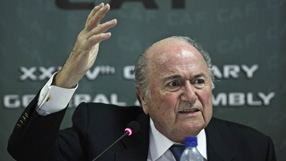
Blatter, in England for this weekend's meeting of the game's law-making body - the International Football Association Board, told reporters it was now time to "move forward" and embrace the goal-line technology he was once so opposed to.
IFAB, which comprises four FIFA representatives and the four British nations, will consider a report on the latest tests of goal-line technology with a final decision expected to be taken after the European Championship final in Kiev on July 2.
Blatter has said he wants technology in place by the 2014 World Cup in Brazil although UEFA President Michel Platini and Franz Beckenbauer, head of FIFA's Football Taskforce 2014, are both opposed to it.
Speaking as he arrived, Blatter said: "We don't want a repeat of the last World Cup.
"I think I can convince the IFAB board that we must go forward with technology, we cannot afford to just wait and see what happens.
"Platini doesn't want it but I wouldn't be again in a World Cup and witness another situation like that - I would die."
Among the other issues on this weekend's agenda are the possibility of a fourth substitute during extra-time and whether IFAB will overturn its ban on Muslim women players wearing headscarves.
The best features, fun and footballing quizzes, straight to your inbox every week.
The hijab was banned on safety grounds in 2007 but Prince Ali of Jordan, Asia's vice-president on the FIFA Executive Committee, will present IFAB with a specially-designed Dutch headscarf that has velcro fastenings and opens immediately if pulled.
IFAB will also review the so-called "triple sanction" rule which FIFA now believes is unfair in punishing an offending player too harshly if he denies an opponent a goal-scoring opportunity.
At the moment he faces conceding a penalty, receiving a red card and then a suspension.
FIFA is proposing that a red card should only be automatic outside the penalty area and that if a spot-kick is awarded then the referee should only dismiss the offending player for "denying an opponent an obvious goal-scoring opportunity by holding or an offence committed from behind inside his own penalty area when he has no opportunity to play the ball".
The International Board, formed in 1886, predates the foundation of FIFA by 18 years and is the game's ultimate law-making authority. Any law or rule changes need a 75 percent majority to be accepted.
 Join The Club
Join The Club





